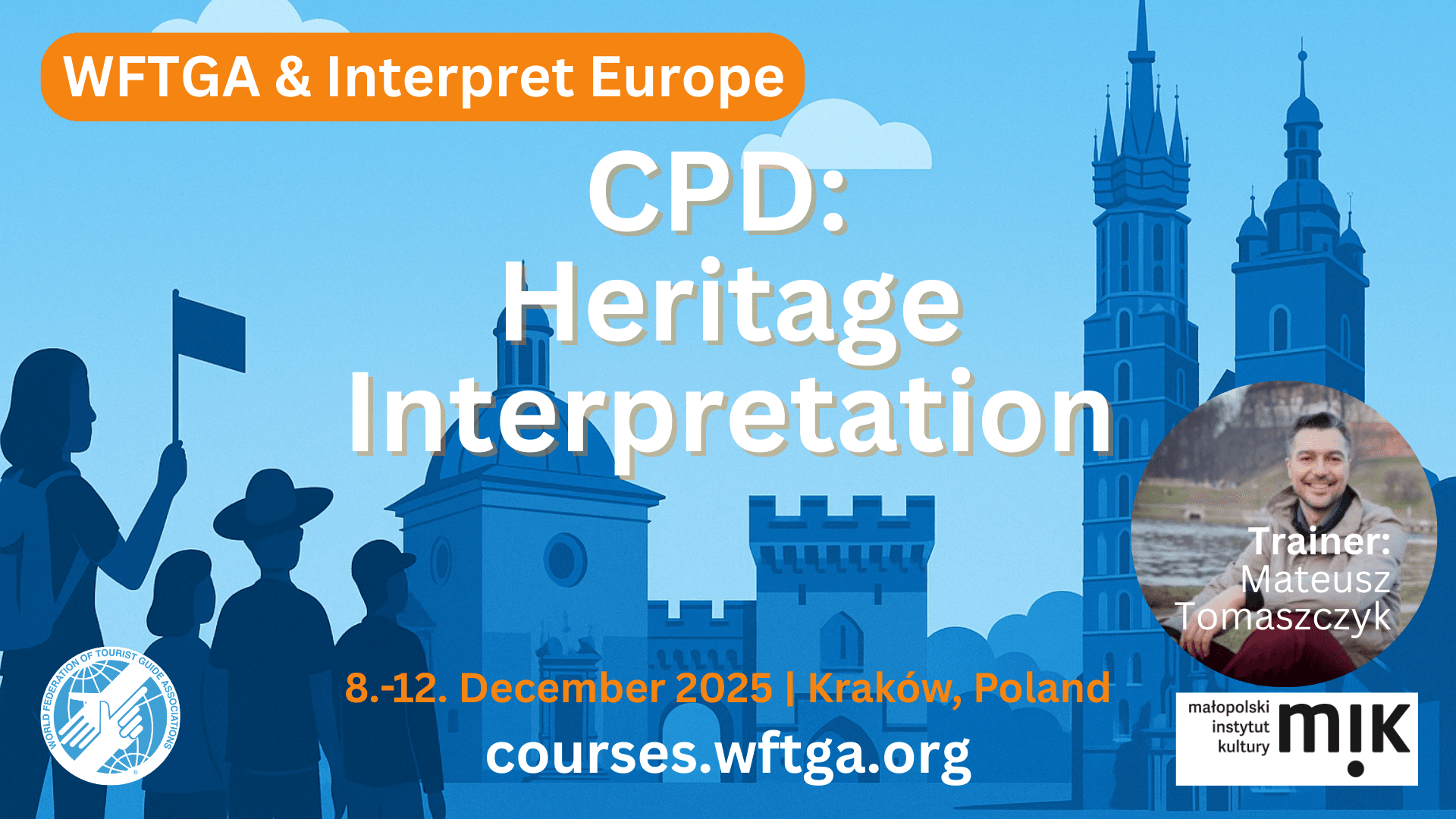
The World Federation of Tourist Guide Associations (WFTGA), in cooperation with the Małopolska Institute of Culture, is delighted to present the Certified Interpretive Guide (CIG) course certified by Interpret Europe — a hands-on, immersive training designed to elevate heritage interpretation skills.
Over five days in the enchanting setting of Kraków’s Historic Centre, participants will explore personal interpretation, communication strategies, accessibility, critical evaluation, sustainability, and meaning-making through a series of practical exercises and peer feedback.
This 40‑hour course empowers guides to transform heritage phenomena into engaging experiences and passive audiences into active, inspired participants.
From 950,00 €
Language:
The Course will be delivered in English. Practical assessments and written examinations will be conducted in English. Therefore, participants require a working knowledge of English, both written and spoken.
Set in real heritage contexts, it equips participants to design and deliver meaningful, engaging interpretation for diverse audiences and settings.
Personal interpretation – connecting places, objects and stories to people’s lives; using themes and universal concepts to create relevance and resonance.
Communication skills – structuring commentary, voice and body language, questioning and listening techniques, managing time and space, and ensuring clarity and accessibility.
Meaning-making – moving beyond facts to reveal relationships, ideas and values; crafting strong themes and purposeful narratives that provoke curiosity and reflection.
Interactive tools for working with tourist groups – activity-based techniques, sensory prompts, use of objects and props, mapping and simple games to energise and involve participants.
Facilitation skills – enabling dialogue, handling group dynamics, encouraging participation, managing expectations and emotions, and guiding respectful, value-based exchanges.
While the course includes concise input sessions, most learning is hands-on and reflective. Methods include:
Indoor and field exercises that translate concepts into practice
Exercises in museum exhibitions, working directly with tangible and intangible heritage
Structured discussions to deepen understanding and share perspectives
Simulations and presentations to rehearse real guiding scenarios
Feedback from trainers and peers to refine delivery and sharpen messages
Short lectures to anchor practice in proven interpretive principles
Day 1 – Foundations of Interpretation
What is heritage interpretation and how do we help people find meaning?
Core concepts, ethics and standards; practising essential interpretive skills
Day 2 – Interpretive Talks
Experiencing, developing, conducting and evaluating interpretive talks
Crafting clear themes, structuring content, engaging openings and memorable closes
Day 3 – Interpretive Walks
Creating and embedding (memorising) interpretive walks and storylines
Conducting walks; peer review focused on clarity, flow and audience engagement
Day 4 – Roving Encounters & Facilitation
Initiating and facilitating free (roving) interpretive encounters
Techniques for exchange and value-based interpretation; inclusive practice
Day 5 – Assessment & Consolidation
Exams: conducting and peer reviewing interpretive talks
Final reflections, individual feedback and next steps towards certification
Participants will practise how to:
Facilitate first-hand experience with natural and cultural heritage sites and objects
Address tangible and intangible heritage, linking the seen and the unseen
Reveal meanings and relationships between phenomena rather than listing facts
Derive attractive themes from sites, objects and information to guide interpretation
Respond to participants’ needs and expectations in the moment
Adopt different roles as an interpretive guide (host, facilitator, storyteller, mediator)
Use questioning techniques and other communication tools to stimulate dialogue
Apply group formation strategies and make effective use of props
Connect information to participants’ own worlds, values and experiences
Recognise and navigate barriers and interferences in interpretive processes
Practise peer coaching and critiquing to strengthen professional judgement
Integrate sustainability and global concerns into interpretive activities
✅ Five days of training (40 hours total, 09:00–17:30 daily)
✅ Facilitation from two certified trainers
✅ All course materials, training facilities, and museum access
✅ Official certificate of attendance (WFTGA & MIK)
✅ Ongoing guidance and feedback on CIG certification tasks, during and after the course
✅ Morning coffee and lunch provided daily
❌ Travel and accommodation costs (participants to arrange independently)
❌ Mandatory Interpret Europe membership (required for certification; payable separately)
❌ Personal travel, health, and cancellation insurance
❌ Visa fees (if applicable)
Upon successful completion, participants will gain the Certified Interpretive Guide (CIG) credential, awarded by Interpret Europe. Certification requires:
These components align with Interpret Europe’s standards and ensure high-quality interpretive practice.
Pathways for further advancement are available, including progression to Interpretive Trainer or Interpretive Writer qualifications under the Interpret Europe framework.
Małopolska Institute of Culture in Kraków, in cooperation with the WFTGA Training Committee
Lorem ipsum dolor sit amet, consectetur adipiscing elit, sed do eiusmod tempor incididunt ut labore et dolore magna aliqua. Ut enim ad minim veniam, quis nostrud exercitation ullamco laboris nisi ut aliquip ex ea commodo consequat. Duis aute irure dolor in reprehenderit in voluptate velit esse cillum dolore eu fugiat nulla pariatur. Excepteur sint occaecat cupidatat non proident, sunt in culpa qui officia deserunt mollit anim id est laborum.